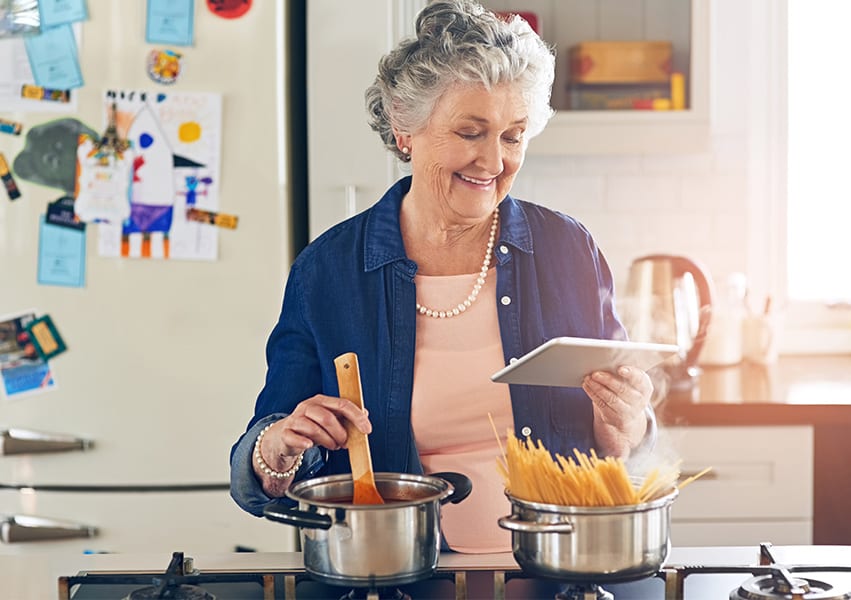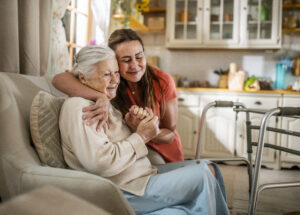All of us have some happy memories attached to being in the kitchen. Whether it’s gathering for a Thanksgiving meal you’ve helped prepare or making cookies from scratch with your grandmother, food brings people together in a way that no other experience can.
It’s no secret either: mental health professionals are beginning to use the culinary arts as a form of therapy for a wide variety of mental illnesses. Not only can cooking help feed you, but it can also provide numerous physical, emotional, and mental benefits.
This was also explored in a recent study at Edith Cowan University. The research showed that confidence in the kitchen had a positive result on mental health, which carried on for a while after the course was completed.
According to the study, Researchers found those who participated in a 7-week healthy cooking class saw improvements in general health, mental health, and subjective vitality immediately after the program. The effects lasted approximately six months after completing the course when compared to a control group.
Let’s go over some of the ways cooking can positively impact seniors’ mental health and how it can help you to stay active and engaged.
PLANNING MEALS
Cooking is a process that requires a certain degree of planning. You have a recipe you must follow, which requires having the right ingredients on hand and following the steps in order so your food comes out properly. Being involved in this process is great for seniors.
First, you can help keep your mind sharp by making note of what ingredients must be purchased to follow the recipe correctly. Then, you can stay active by going to the store and buying said ingredients, giving you the opportunity to get out of the house and be around others. Since cooking requires attention to time and detail, you will have to be focused to ensure that your dish is made properly.
Continuing to remain active, like when cooking in your own kitchen for yourself or for those you love, is one of the best ways to stay independent for as long as possible. Plus, staying active and working on your memory is one of the best ways to fight off dementia and Alzheimer’s disease.
CREATIVITY IN THE KITCHEN
If you’re looking for the opportunity for creative freedom while creating something that you can be proud of, cooking is a great hobby to pursue. While recipes provide good guidelines for creating a meal, there’s always room to explore adding or removing something to make the recipe the way you like it.
Being able to tailor a recipe to your wants and needs may require a level of creative problem solving too. If you’re allergic to a key ingredient, what can you use to supplement the recipe without ruining it?
Even if the recipe goes wrong, you’ll have learned something about the process and how things went wrong. Cooking is about the journey, not just the meal at the end!
SOCIALIZATION OPPORTUNITIES
It’s impossible to begin the process of cooking without socializing with others. You experience this when you first step into the grocery store to shop and have to interact with others.
Talk to the butcher if you have questions about a kind of meat, or ask the cashier how his day is going. Being around others is great for one’s social and mental well being.
Cooking itself doesn’t have to be a solitary activity either. In fact, cooking can provide the most benefits when cooking with others. By collaborating with others and working on a meal together, you can build a sense of camaraderie and enjoy socializing with one another.
Sharing meals with others is a form of connection and allows you to share in their lives. Cooking for friends and family is a form of nurturing and providing support for them and offers the opportunity to socialize over a meal you’re proud of making.
And don’t forget about cooking classes for seniors! Classes can be a great opportunity to socialize, gain confidence, and learn new cooking techniques. Find a class that interests you and sign up!
BETTER NUTRITION
However, better mental health isn’t the only benefit to being in the kitchen. It can also provide healthy food for seniors – and not just for the people who have prepared the meal, but to the others with whom the meal is shared.
If you go to any fast food restaurant, it’s highly unlikely you know all of the ingredients that went into your food. Even more unlikely that you know the detailed nutritional facts of the fast food you’re consuming. As you age, a healthy diet is a big part of taking care of your body and your nutrition becomes more and more important to living a long, healthy life.
Cooking your own meals means you have the opportunity to choose what goes into your food. You can pay attention to eliminating calorie-dense additional ingredients or limiting your fat intake. Choosing your ingredients is an opportunity that fast food simply doesn’t offer in the way home cooking does.
Not only do you know your food better when it comes to ingredients, you can serve better portions. Fast food comes in portion sizes that are larger than necessary and can lead to an excess of calories. Portion sizes are better controlled when cooking and serving your own food, meaning less time in the gym to burn off those extra pounds!
As elderly mental health issues become a bigger priority, look for ways to incorporate cooking as part of a healthy lifestyle both mentally and physically. It’s another fun way to stay active.
Are you a senior who needs assistance with cooking? Contact Culpepper Place today. Our assisted living facility allows you a kitchenette with healthy meals prepared by our staff daily.






